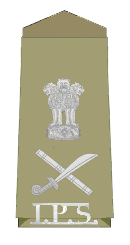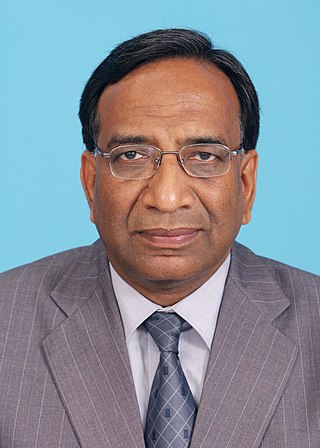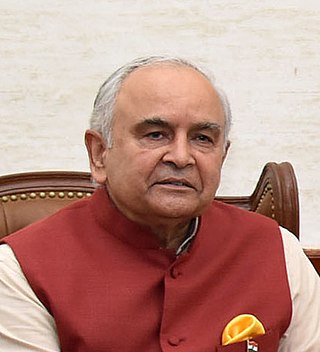
The Indian Police Service is a civil service under the All India Services. It replaced the Indian Imperial Police in 1948, a year after India became independent from British Raj.

The Indian Administrative Service (IAS) is the administrative arm of the All India Services of Government of India. The IAS is one of the three arms of the All India Services along with the Indian Police Service and Indian Forest Service. Members of these three services serve the Government of India as well as the individual states. IAS officers are also deployed to various government establishments such as constitutional bodies, staff and line agencies, auxiliary bodies, public sector undertakings, regulatory bodies, statutory bodies and autonomous bodies.

Director General of Police (DGP) is a rank in the Indian Police Service, held by the highest ranking police officer in a State or a Union Territory of India, typically heading the state or the UT police force. The DGP is appointed by the cabinet and holds a three-star rank.
The All India Services (AIS) comprises three civil services in India common to the centre and state governments, which includes the Indian Administrative Service (IAS), the Indian Police Service (IPS), and the Indian Forest Service (IFS). Civil servants recruited through All India Services by the central government are assigned to different state government cadres. Some civil servants may, later in their career, also serve the centre on deputation. Officers of these three services comply to the All India Services Rules relating to pay, conduct, leave, various allowances etc.

The Union Public Service Commission is a constitutional body of India that conducts direct recruitment of officers to the All India Services and the Central Civil Services through examinations and appoints officers in various Services under the Government of India. The personnel are managed by the Department of Personnel and Training.

Central Vigilance Commission (CVC) is an apex Indian governmental body created in 1964 to address governmental corruption. In 2003, the Parliament enacted a law conferring statutory status on the CVC. It has the status of an autonomous body, free of control from any executive authority, charged with monitoring all vigilance activity under the Central Government of India, advising various authorities in central Government organizations in planning, executing, reviewing, and reforming their vigilance work.
The Ministry of Personnel, Public Grievances and Pensions is a ministry of the Government of India in personnel matters specially issues concerning recruitment, training, career development, staff welfare as well as the post-retirement dispensation.

The Ministry of Finance is a ministry within the Government of India concerned with the economy of India, serving as the Treasury of India. In particular, it concerns itself with taxation, financial legislation, financial institutions, capital markets, centre and state finances, and the Union Budget.
Radhakant Nayak is an Indian politician, bureaucrat & educationist belonging to the Indian National Congress party. He served as a member of the Parliament of India representing Orissa in the Rajya Sabha, the upper house of the Indian Parliament between 2004 till 2010. Radhakant Nayak, a 1962 batch IAS officer. Nayak is also connected with YMCA and is one of the most high-profile Christians in Orissa
The Manipur Public Service Commission is the Constitutional body constituted for recommending candidates for recruitment to various posts of the Government of Manipur. It also gives concurrence on the recommendation of Departmental Promotion Committee for appointment to various posts. The Commission also gives concurrence on the framing/ amendment of Recruitment Rules. It also tender advice to the Government Departments on service matters including disciplinary cases.
Central Secretariat Service is the administrative civil service under Group A and Group B of the Central Civil Services of the executive branch of the Government of India. They are governed by Central Secretariat Service Rules of 1962, which has been issued under the powers of Article 309 of the Constitution of India. The service members work under restrictions and rules of Central Civil Services (Conduct) Rules.
In India, the Civil Service is the collection of civil servants of the government who constitute the permanent executive branch of the country. This includes servants in the All India Services, the Central Civil Services, and various State Civil Services, who are recruited by the Union Public Service Commission (UPSC), the Staff Selection Commission (SSC), and each state's Public Service Commissions.
Mihir Shah is an Indian economist and former member of the erstwhile Planning Commission of India.

Pradeep Kumar is a former Indian Administrative Service (IAS) officer, 1972 batch, of the Haryana cadre, who served as Defense Secretary, in the Ministry of Defence, Government of India, for a term of two years, from August 2009 to July 2011. He succeeded Vijay Singh, IAS, 1970 batch, who, on superannuation, was appointed as member of the UPSC. In July 2011, on superannuation, he was appointed as chief vigilance commissioner of India.
The Tamil Nadu Public Service Commission (TNPSC) is a department of the government of Tamil Nadu that is responsible for governing the recruitment of personnel into the state's public service. It is the successor of the Madras Service Commission, which came into being under an Act of the Madras Legislature in 1929 and was the first Provincial Public Service Commission in India. It adopted its current name in 1970. TNPSC operates under Articles 315 to 323 of Part XIV of the Constitution of India.
The Indian Ordnance Factories Service (IOFS) is a civil service of the Government of India. IOFS officers are Gazetted defence-civilian officers under the Ministry of Defence. They are responsible for the administration of the Indian Ordnance Factories, which provide the indigenous defence production capabilities of India.

Lt Gen (Retd.) Nirbhay Sharma PVSM, UYSM, AVSM, VSM is the former Governor of Mizoram and former Governor of Arunachal Pradesh.
Police Complaints Authority (PCA) is a body that adjudicates allegations of improper or shoddy investigations, refusal to file FIRs, custodial torture and high-handedness against the police. But its recommendations are high authorities and recognised governmental authority upon the state government for action against errant police personnel. Seventeen States have established the PCAs through State Police Acts, while ten states have done this through executive orders with a long-term goal of the PCAs is changing the policing culture and making it thoroughly professional.

K. Padmanabhaiah is a retired Indian civil servant and a former Home Secretary of India. He is the chairman of the Court of Governors of the Administrative Staff College of India, and has headed many government committees such as the Committee on Police Reforms (2000), the Committee on Reorganization of the Services Selection Board, and the committee to Review the working of National Institute of Urban Management. The Government of India awarded him the third highest civilian honour of the Padma Bhushan, in 2008, for his contributions to Indian civil service.

Shri Upendra Tripathy is a retired Indian Administrative Service (IAS) officer of Karnataka Cadre. He is the first Director General of the International Solar Alliance. Well known for receiving the prestigious Prime Minister’s Awards for Excellence in Public Administration in individual category, Tripathy received several other awards for his innovations and ideas during his career as a civil servant. He was the first and founding Director General of International Solar Alliance which the first treaty based International Organisation head-quartered in India. ISA is an alliance of 121 countries worldwide focusing on solar power utilisation, co-operation, and sustainable energy. Previously, Mr. Tripathy was the Secretary to Ministry of New and Renewable Energy from 1 April 2014 until 31 October 2016. Mr. Tripathy has been appointed as Advisor cum working president and chairman of executive committee of Odisha Adarsha Vidyalaya on 3 August 2021 after the death of previous Advisor cum chairman Dr. Bijaya Kumar Sahoo in June 2021 due to covid









